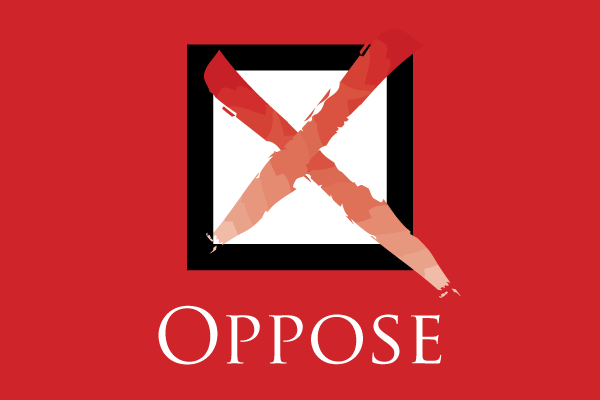
A coalition led by the California Chamber of Commerce has stopped legislation that would have created an extraordinary new scheme of product liability resulting in thousands of new lawsuits holding entities retroactively liable for alleged harms those entities did not cause.
Rejected in an Assembly vote last week was AB 2995 (Carrillo; D-Los Angeles), which sought to significantly expand tort liability for lead paint by stating that any amount of lead paint on the interior or exterior of the home is an injury to the property for which damages can be recovered.
Placed on the Assembly Inactive File at the author’s request this week was another bill expanding liability, AB 2074 (Bonta; D-Oakland). It would have created an unprecedented basis for tort liability in California by imposing joint and several liability on any company in the stream of commerce for injury caused by a product, even though the company did not create the product, know of the harm it posed, or cause the harm suffered.
‘Injury to Property’
AB 2995 would have defined the mere presence of lead-based paint on a property as an “injury,” automatically defining every home in California with a drop of lead-based paint as an injured property, regardless of whether actual lead-based paint risks existed.
AB 2995 would have established the “injury to property” that permitted the absolute liability provisions in AB 2074 to apply.
Fundamental Concerns
Amendments to AB 2074 did not address the fundamental concerns with the bill. Under AB 2074 as amended, a company still could be held 100% liable for harm from lead-based paint inside California homes, even though the company did not make, distribute or sell the lead pigment or lead-based paint that caused injury.
In fact, a company whose lead pigment never made its way into a single can of house paint in California could be held 100% liable to abate lead paint in houses across the state.
AB 2074 would have permitted a plaintiff to establish a prima facie case if it proved a “lead paint pigment manufacturer” sold, distributed or promoted either “the type of lead paint pigment” or “a product containing the type of lead paint pigment” that caused the injury.
Problematic Amendments
The amendments to AB 2074 were problematic for several reasons:
• It was unclear what the term “lead paint pigment” means.
• The amendments omitted a significant factor—that companies manufactured, distributed, sold or promoted either lead pigment or lead paint for a particular purpose with either actual or constructive knowledge that the product would cause an injury.
• AB 2074 still imposed liability on the named entity unless it could prove a near-impossible defense—that it never manufactured, sold, distributed or promoted the product in the “geographical area” or during the “relevant time period,” both of which were undefined.
Liability under AB 2074 remained “joint and several,” meaning an entity that did not manufacture, distribute, sell, market or promote lead paint for use inside a home in California could be 100% liable for all damages in California, even though the entity had no connection to the alleged harm.
Imposing absolute liability on entities that are not responsible for the alleged harm—in any context—would have been unprecedented and would have set a troubling precedent for all types of consumer products sold in California.
Key Vote
AB 2995 failed to pass the Assembly on May 31 on a vote of 30-35.
Ayes: Arambula (D-Kingsburg), Berman (D-Palo Alto), Bloom (D-Santa Monica), Bonta (D-Oakland), Carrillo (D-Los Angeles), Chau (D-Monterey Park), Chiu (D-San Francisco), Chu (D-San Jose), Friedman (D-Glendale), Gloria (D-San Diego), Gonzalez Fletcher (D-San Diego), Jones-Sawyer (D-South Los Angeles), Kalra (D-San Jose), Kamlager-Dove (D-Los Angeles), Levine (D-San Rafael), Limón (D-Goleta), Low (D-Campbell), McCarty (D-Sacramento), Mullin (D-South San Francisco), Muratsuchi (D-Torrance), Nazarian (D-Sherman Oaks), Quirk (D-Hayward), Rendon (D-Lakewood), Reyes (D-Grand Terrace), Santiago (D-Los Angeles), M. Stone (D-Scotts Valley), Thurmond (D-Richmond), Ting (D-San Francisco), Weber (D-San Diego), Wood (D-Healdsburg).
Noes: Acosta (R-Santa Clarita), T. Allen (R-Huntington Beach), Baker (R-San Ramon), Bigelow (R-O’Neals), Brough (R-Dana Point), Caballero (D-Salinas), Cervantes (D-Riverside), Chávez (R-Oceanside), Chen (R-Walnut), Choi (R-Irvine), Cooley (D-Rancho Cordova), Cunningham (R-Templeton), Dahle (R-Bieber), Eggman (D-Stockton), Flora (R-Ripon), Fong (R-Bakersfield), Frazier (D-Discovery Bay), Gallagher (R-Yuba City), Gray (D-Merced), Grayson (D-Concord), Harper (R-Huntington Beach), Kiley (R-Granite Bay), Lackey (R-Palmdale), Maienschein (R-San Diego), Mathis (R-Visalia), Mayes (R-Yucca Valley), Medina (D-Riverside), Melendez (R-Lake Elsinore), Obernolte (R-Big Bear Lake), Patterson (R-Fresno), Quirk-Silva (D-Fullerton), Salas (D-Bakersfield), Steinorth (R-Rancho Cucamonga), Voepel (R-Santee), Waldron (R-Escondido).
No votes recorded: Aguiar-Curry (D-Winters), Burke (D-Inglewood), Calderon (D-Whittier), Cooper (D-Elk Grove), Daly (D-Anaheim), C. Garcia (D-Bell Gardens), E. Garcia (D-Coachella), Gipson (D-Carson), Holden (D-Pasadena), Irwin (D-Thousand Oaks), O’Donnell (D-Long Beach), Rodriguez (D-Pomona), Rubio (D-Baldwin Park).



